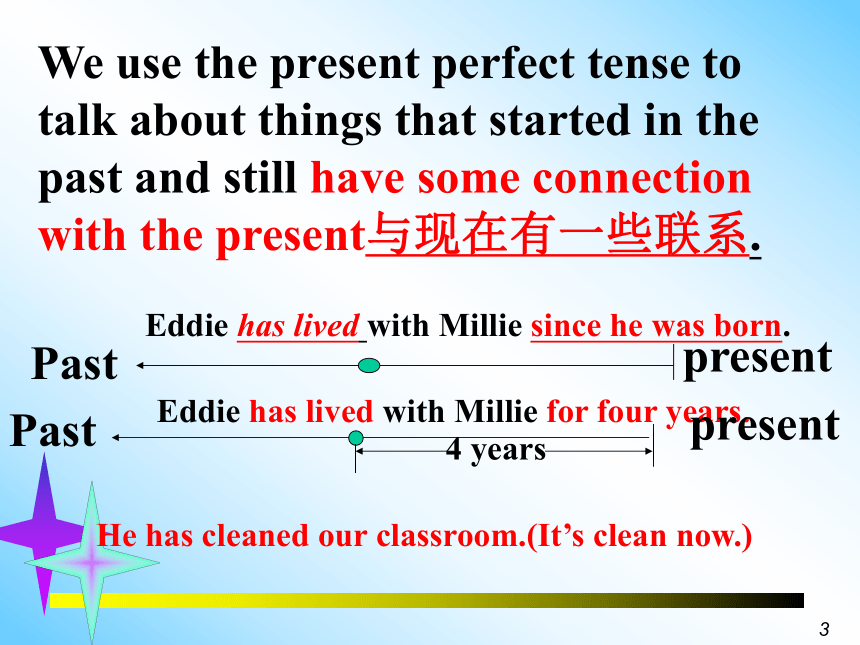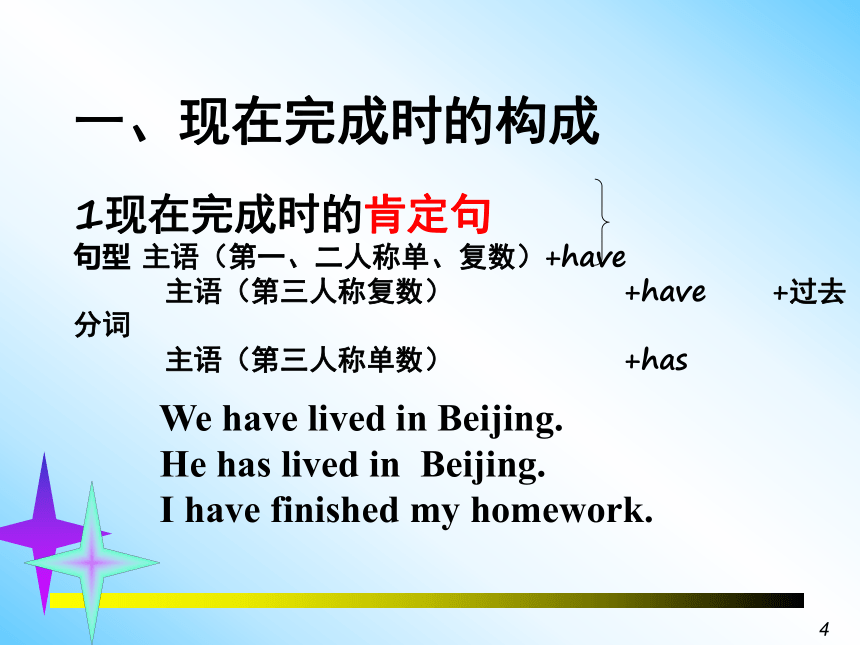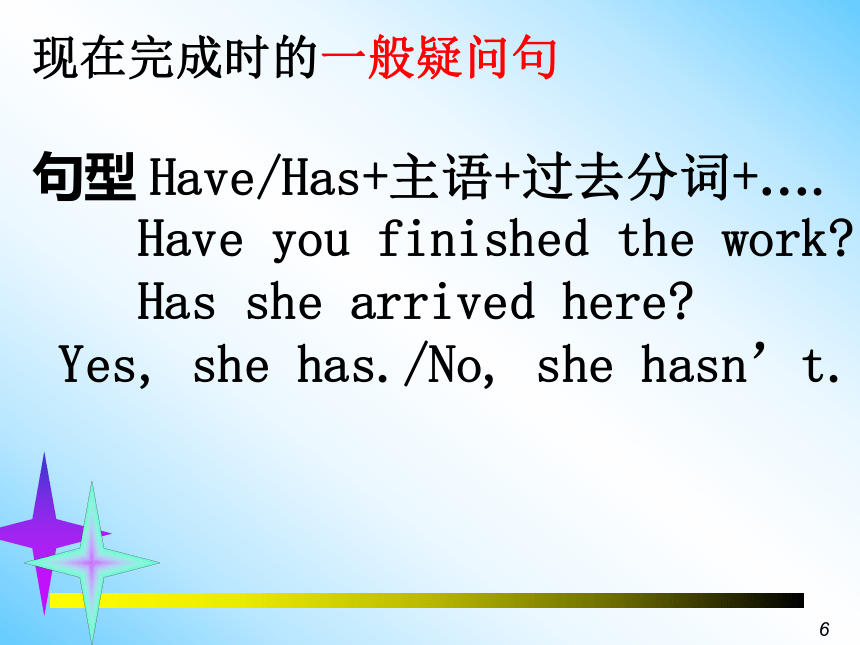8b unit1-3 grammar(共29张PPT)
文档属性
| 名称 | 8b unit1-3 grammar(共29张PPT) |  | |
| 格式 | zip | ||
| 文件大小 | 866.1KB | ||
| 资源类型 | 教案 | ||
| 版本资源 | 牛津译林版 | ||
| 科目 | 英语 | ||
| 更新时间 | 2014-09-07 21:37:40 | ||
图片预览









文档简介
课件29张PPT。Grammar六合区实验初中龙Unit1---Unit3Grammar 1 The Present Perfect TenseWe use the simple past tense to talk about what happened at a definite time in the past(在一个确切的过去时间).
Past present
Eddie was born four years ago.We use the present perfect tense to talk about things that started in the past and still have some connection with the present与现在有一些联系.
Eddie has lived with Millie since he was born.
Eddie has lived with Millie for four years.
He has cleaned our classroom.(It’s clean now.)
presentPastPastpresent4 years一、现在完成时的构成 1现在完成时的肯定句 句型 主语(第一、二人称单、复数)+have 主语(第三人称复数) +have +过去分词 主语(第三人称单数) +has We have lived in Beijing.
He has lived in Beijing.
I have finished my homework.2现在完成时的否定句
句型 主语+have/has+not+过去分词+……
I have not seen the movie yet.
He hasn’t been to Beijing .
现在完成时的一般疑问句
句型 Have/Has+主语+过去分词+….
Have you finished the work?
Has she arrived here?
Yes, she has./No, she hasn’t.4现在完成时的特殊疑问句
句型 特殊疑问词+have/has+主语+过去分词+…….
How many times have you been to the Great Wall?have/has been to 曾经去过某地
have/has gone to 已经去了某地
have/has been( in ) 已经在某地多久1.He ( ) the USA twice.2.Where is Tom? He ( )the bookshop.3.Sandy ( ) Nanjing for a long time. has been tohas gone tohas been in完成时中的延续性动词与非延续性动词 .延续性动词表示能够延续的动作,如:learn, work, stand, lie, know, walk, keep, have, wait, watch, sing, read, sleep, live, stay等。延续性动词可以与表示时间段的状语连用。
表示时间段的短语有:for+一段时间,for 2 years; since从句,since he came here; since+时间点名词,since last year, since 5 days ago; how long; for a long time等。 动词按其动作发生的方式、发生过程的长短可分为延续性动词与非延续性动词。 例:He has lived here for 6 years. You can keep the book for 5 days. I stayed there for 2 weeks last year. How long did you stay there last year? .
非延续性动词也称终止性动词、瞬间动词,表示不能延续的动作,这种动作发生后立即结束。 如:open, die, close, begin, finish, come, go, move, borrow, lend, buy等。
非延续性动词在肯定句中与表示时间点的状语连用,如:two years ago; at 5 o'clock;
例:He died 5 years ago. 例: He has died.
否定的终止性动词可以与表示时间段的时间状语连用。例:I haven't left here for 3 years. I haven't heard from him for 3 weeks..延续性动词与非延续性动词之间的转换:
borrow / lend→keep, buy→have, finish / end→be over, arrive /come / go / move / reach /get to→be in /at / be here /be there, begin / start→be on , open→be open , close→be closed, die→be dead , leave→be away(from),go to school→be in school / be a student, get up→be up, fall asleep→be asleep , fall ill→be ill, get to know→know, lose→be lost, become→be, return / come back / get back→be back, join→be in / be a…member of, join the army→be in the army /be a soldier, receive / get a letter→have a letter , catch / get a cold→have a cold, begin to study→study ,go (get) out →be out, put on→ wear 1.The old man died 4 years ago. a. The old man has been dead for 4 years. b. It is 4 years since the old man died. c. Four years has passed since the old man died. 2.He joined the Party 2 years ago. He has been in the Party for 2 years. 3.I bought the book 5 days ago I have had the book for 5 days. The Passive Voice被动语态构成助动词 be + 及物动词的过去分词 be + vt. p. p.Many peopleEnglishspeakEnglish.is spokenby many people.A recordera recorder use …in…is used in our English class every day. playoftenFootballA camerause … for …is often played all over the world.is used fortaking photos.rob yesterdayA man-made satelliteA banksend up last yearwas robbed yesterday.was sent upspace last year.into must plantThe treeThe groundbe covered withmust be planted on theground.will be covered with in a few years’ time. trees dig(挖)The earthThe food eat upis beingdug now.has been eaten up already.Football is played all over the world.A camera is used for taking photos.A bank was robbed yesterday.A man-made satellite was sent up into space last year.The tree must be planted on the ground.The ground will be covered with trees in a few years’ time. They will be sent to the hospital right now.A talk will be given by Mr. Wang soon.The earth is being dug now.The food has been eaten up already.一般现在时:am / is / are + vt.p.p. 一般过去时: was / were + vt.p.p. 一般将来时: will be / be going to be + vt.p.p. 情态动词:must /can /could /may + be + vt.p.p.现在进行时: be (am / is / are) + being + vt.p.p.现在完成时: have / has +been + vt.p.p.被动语态的构成:be +vt.p.p.被动语态:当我们不知道谁是动作的执行者,或者没有必要指出谁是动作的执行者时,或者只需强调动作的承受者时,要用被动语态。何时使用被动语态?主语是动作的承受者 。主动语态如何改成被动语态?1. 主动语态的宾语改成被动语态的主语.2. 主动语态的谓语动词改成被动语态的谓语动词。do3. 注意保持时态和人称的一致。 4. 带双宾的谓语动词有两种改法。当把直接宾语改成主语时,谓语动词后必须加适当的介词: to, for.be donepass, show, send… 此类动词有:5. 一些动词不定式在主动语态中省略to作宾语补足语,改成被动语态时,to必须还原。make sb do sth. / sb be made to do sth.注: 1. 不及物动词(vi.)不用被动语态。buybe bought for如:givebe given to 此类动词还有:draw,make, cook, mende.g. happen, appear, disappear e.g. A traffic accident ________(happen) just now.happened2. 连系动词(后加形容词)(Link.v.)不用被动语态。 如:be, look, seem, feel, sound, smell, taste, get, turn, become… e.g. Peking Opera _______ (sound) beautiful.sounds 3. 当此动词表示事物的自然属性的时候,不用被动语态 。 e.g. The pen __________(write) very fast.writes This kind of sweater _______(sell) well. sells动词短语的被动语态take care of → be taken care ofcut down → be cut downlaugh at → be laughed atlook after → be looked after被动语态的动词短语以下这些短语本身即是被动语态的形式,不需再加 “by” .be covered with 用...覆盖be interested in 对...感兴趣be surprised at 对...感到惊奇be made of / from 用…制成的be known to 出名 ChineseI A new bike is spokenby manywas boughta new bikewas bought yesterday.for meTurn them into the passive voice. Many people speak Chinese.people.He bought me a new bike yesterday. yesterday.→The boss made him do the heavy work in the old days.heavy work in the old days.to dowas made Hethe Tom must hand in the composition after class. The composition must be handed in after class.Goodbye
Past present
Eddie was born four years ago.We use the present perfect tense to talk about things that started in the past and still have some connection with the present与现在有一些联系.
Eddie has lived with Millie since he was born.
Eddie has lived with Millie for four years.
He has cleaned our classroom.(It’s clean now.)
presentPastPastpresent4 years一、现在完成时的构成 1现在完成时的肯定句 句型 主语(第一、二人称单、复数)+have 主语(第三人称复数) +have +过去分词 主语(第三人称单数) +has We have lived in Beijing.
He has lived in Beijing.
I have finished my homework.2现在完成时的否定句
句型 主语+have/has+not+过去分词+……
I have not seen the movie yet.
He hasn’t been to Beijing .
现在完成时的一般疑问句
句型 Have/Has+主语+过去分词+….
Have you finished the work?
Has she arrived here?
Yes, she has./No, she hasn’t.4现在完成时的特殊疑问句
句型 特殊疑问词+have/has+主语+过去分词+…….
How many times have you been to the Great Wall?have/has been to 曾经去过某地
have/has gone to 已经去了某地
have/has been( in ) 已经在某地多久1.He ( ) the USA twice.2.Where is Tom? He ( )the bookshop.3.Sandy ( ) Nanjing for a long time. has been tohas gone tohas been in完成时中的延续性动词与非延续性动词 .延续性动词表示能够延续的动作,如:learn, work, stand, lie, know, walk, keep, have, wait, watch, sing, read, sleep, live, stay等。延续性动词可以与表示时间段的状语连用。
表示时间段的短语有:for+一段时间,for 2 years; since从句,since he came here; since+时间点名词,since last year, since 5 days ago; how long; for a long time等。 动词按其动作发生的方式、发生过程的长短可分为延续性动词与非延续性动词。 例:He has lived here for 6 years. You can keep the book for 5 days. I stayed there for 2 weeks last year. How long did you stay there last year? .
非延续性动词也称终止性动词、瞬间动词,表示不能延续的动作,这种动作发生后立即结束。 如:open, die, close, begin, finish, come, go, move, borrow, lend, buy等。
非延续性动词在肯定句中与表示时间点的状语连用,如:two years ago; at 5 o'clock;
例:He died 5 years ago. 例: He has died.
否定的终止性动词可以与表示时间段的时间状语连用。例:I haven't left here for 3 years. I haven't heard from him for 3 weeks..延续性动词与非延续性动词之间的转换:
borrow / lend→keep, buy→have, finish / end→be over, arrive /come / go / move / reach /get to→be in /at / be here /be there, begin / start→be on , open→be open , close→be closed, die→be dead , leave→be away(from),go to school→be in school / be a student, get up→be up, fall asleep→be asleep , fall ill→be ill, get to know→know, lose→be lost, become→be, return / come back / get back→be back, join→be in / be a…member of, join the army→be in the army /be a soldier, receive / get a letter→have a letter , catch / get a cold→have a cold, begin to study→study ,go (get) out →be out, put on→ wear 1.The old man died 4 years ago. a. The old man has been dead for 4 years. b. It is 4 years since the old man died. c. Four years has passed since the old man died. 2.He joined the Party 2 years ago. He has been in the Party for 2 years. 3.I bought the book 5 days ago I have had the book for 5 days. The Passive Voice被动语态构成助动词 be + 及物动词的过去分词 be + vt. p. p.Many peopleEnglishspeakEnglish.is spokenby many people.A recordera recorder use …in…is used in our English class every day. playoftenFootballA camerause … for …is often played all over the world.is used fortaking photos.rob yesterdayA man-made satelliteA banksend up last yearwas robbed yesterday.was sent upspace last year.into must plantThe treeThe groundbe covered withmust be planted on theground.will be covered with in a few years’ time. trees dig(挖)The earthThe food eat upis beingdug now.has been eaten up already.Football is played all over the world.A camera is used for taking photos.A bank was robbed yesterday.A man-made satellite was sent up into space last year.The tree must be planted on the ground.The ground will be covered with trees in a few years’ time. They will be sent to the hospital right now.A talk will be given by Mr. Wang soon.The earth is being dug now.The food has been eaten up already.一般现在时:am / is / are + vt.p.p. 一般过去时: was / were + vt.p.p. 一般将来时: will be / be going to be + vt.p.p. 情态动词:must /can /could /may + be + vt.p.p.现在进行时: be (am / is / are) + being + vt.p.p.现在完成时: have / has +been + vt.p.p.被动语态的构成:be +vt.p.p.被动语态:当我们不知道谁是动作的执行者,或者没有必要指出谁是动作的执行者时,或者只需强调动作的承受者时,要用被动语态。何时使用被动语态?主语是动作的承受者 。主动语态如何改成被动语态?1. 主动语态的宾语改成被动语态的主语.2. 主动语态的谓语动词改成被动语态的谓语动词。do3. 注意保持时态和人称的一致。 4. 带双宾的谓语动词有两种改法。当把直接宾语改成主语时,谓语动词后必须加适当的介词: to, for.be donepass, show, send… 此类动词有:5. 一些动词不定式在主动语态中省略to作宾语补足语,改成被动语态时,to必须还原。make sb do sth. / sb be made to do sth.注: 1. 不及物动词(vi.)不用被动语态。buybe bought for如:givebe given to 此类动词还有:draw,make, cook, mende.g. happen, appear, disappear e.g. A traffic accident ________(happen) just now.happened2. 连系动词(后加形容词)(Link.v.)不用被动语态。 如:be, look, seem, feel, sound, smell, taste, get, turn, become… e.g. Peking Opera _______ (sound) beautiful.sounds 3. 当此动词表示事物的自然属性的时候,不用被动语态 。 e.g. The pen __________(write) very fast.writes This kind of sweater _______(sell) well. sells动词短语的被动语态take care of → be taken care ofcut down → be cut downlaugh at → be laughed atlook after → be looked after被动语态的动词短语以下这些短语本身即是被动语态的形式,不需再加 “by” .be covered with 用...覆盖be interested in 对...感兴趣be surprised at 对...感到惊奇be made of / from 用…制成的be known to 出名 ChineseI A new bike is spokenby manywas boughta new bikewas bought yesterday.for meTurn them into the passive voice. Many people speak Chinese.people.He bought me a new bike yesterday. yesterday.→The boss made him do the heavy work in the old days.heavy work in the old days.to dowas made Hethe Tom must hand in the composition after class. The composition must be handed in after class.Goodbye
